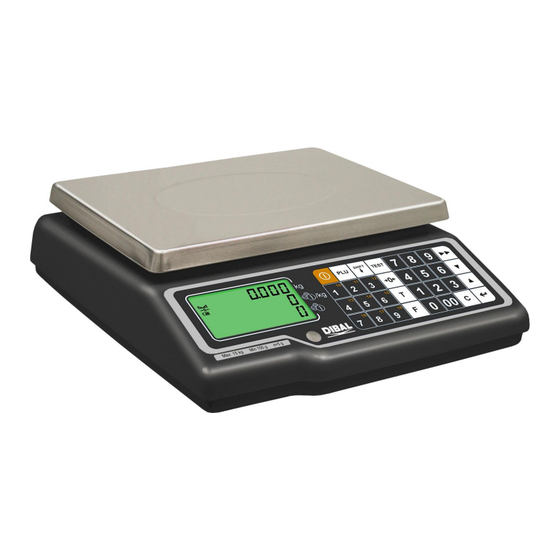Dibal G300 Series Kullanıcı Kılavuzu - Sayfa 5
Terazi Dibal G300 Series için çevrimiçi göz atın veya pdf Kullanıcı Kılavuzu indirin. Dibal G300 Series 12 sayfaları.

USER´S MANUAL
2.4.
USE AND MAINTENANCE ADVICE
1. Never place a weight on the scales that exceeds the maximum limit.
2. Do not place weights suddenly on the dish.
3. Do not exert sideways pressure on the dish.
4. Clean the scales with a damp cloth. Never pour or spray water on the scales. If the scales get
wet, switch off the power supply immediately.
5. Always keep the scales clean.
6. Do not use abrasive chemical substances, solvents or strong detergents to clean the scales
7. Do not use the scales in dirty or dusty places.
2.4.1.
BATTERY OPERATION
Optionally, the scales may be provided with one 6VDC 4.5Ah lead battery. Use original batteries
supplied by DIBAL S.A. the use of any other type will render the scales' guarantee void and may
be dangerous.
New batteries are partly charged. Before you can use your scales, you should put in the battery
and charge it as follows:
To charge the battery, simply plug the scales into the mains. It is not necessary to switch on the
scales. It should take 8 hours to fully charge the battery.
Some batteries perform better after being fully charged/discharged several times.
Battery performance depends on many factors, including background light set-up and operation
set-up.
Only charge the battery in a ventilated room.
When the battery needs to be charged, an icon will light up on the display. Recharge the battery
as soon as the arrow appears over the symbol. The scales will still work for about 10 hours, and
will then switch off automatically in order to protect the battery.
New batteries and batteries that have been stored for a long period of time may require a longer
charging time.
Keep the battery at room temperature or similar when charging.
Do not expose batteries to temperatures below -10°C or above 45°C.
Over a long period of time, the batteries will gradually lose their charging capacity and will
require a longer time for charging. This is normal. If you recharge the battery regularly, and note
that it lasts for a shorter time or charging time is longer, it is probably time to buy a new battery.
Only use the battery for the purpose for which it was designed.
Never use damaged chargers or batteries.
Never short-circuit battery. An accidental short circuit may occur if a metal object (a coin, paper
clip or a ballpoint pen) causes a direct connection between the + and – poles of the battery (the
battery's metal strips), for example, if you are carrying a spare battery in your pocket. Short-
circuiting the poles may harm the battery or the object that is causing the connection.
Do not throw batteries onto fire.
Dispose of batteries according to local regulations (e.g. Recycling). Do not throw them into
domestic rubbish bins.
3
